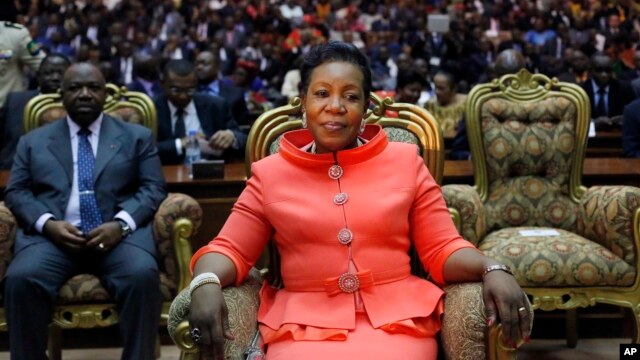May 07, 2014 2:17 PM
DAKAR — Africa has three female heads of state since Catherine Samba-Panza of the Central African Republic took office in January.
Women leaders remain the exception in African politics, but activists say things are looking up. Women are breaking into the "boys club" of the African presidency.
Liberian President Ellen Johnson Sirleaf, or "Ma Ellen," was the first in 2005 as the country emerged from 13 years of brutal civil war. Joyce Banda stepped up in Malawi in 2012 after the sudden death of the president. She had been the vice president.
And now, there's President Samba-Panza in the Central African Republic, a country torn apart by rebellion and sectarian violence.
Each of these women has taken office amid crisis and transition. Countries like Mali have seen their first female presidential candidates. Bad times are finally prying the doors open for aspiring women.
Women are asked to clean up government
"There's a joke I read the other day -- when everything gets messed up, the women are asked to come in and clean up,” says Oley Dibba-Wadda, executive director of Women Africa Solidarity.
Dibba-Wadda says girls and young women are getting much-needed role models. "To say it is possible, I can actually be a president being a woman…These trailblazers have just opened the flood doors and it's just going to happen. There is no thinking of going back. We can't go back."
As African women break political "glass ceilings" at all levels of government, some are criticized for not doing enough for other women.
Mrs. Samba-Panza made it clear from day one that she would be different. About a third of her cabinet is female. "I intend to respect parity because until now, the previous governments didn't give us a lot of seats. There were only two or three women. But I won't choose women, no matter what. I need to have women of worth, who are able to accompany my actions."
Women hold just one-fifth of parliamentary seats and ministerial positions in sub-Saharan Africa. Discrimination remains, but the pool of qualified women is growing as more girls get to stay in school.
At least 16 African countries have passed parity laws. Countries like Rwanda reserve a percentage of parliamentary seats for women, while others like Senegal have set quotas for women on candidate lists.
Parity in politics is a gradual process
The percentage of women in Senegal's legislature doubled in 2012 thanks to the law. But prominent Senegalese politician and presidential adviser Penda Mbow says true equality requires societal change.
"Parity laws may be one tool but they are not enough,” Mbow says. “We also need to fix what goes on inside political parties and let capable, promising women emerge naturally so that when they are promoted, no one can say they got special treatment."
Africa now has three formidable female presidents tackling everything from security to corruption. Half a century after independence, women's time may have come.
Women leaders remain the exception in African politics, but activists say things are looking up. Women are breaking into the "boys club" of the African presidency.
Liberian President Ellen Johnson Sirleaf, or "Ma Ellen," was the first in 2005 as the country emerged from 13 years of brutal civil war. Joyce Banda stepped up in Malawi in 2012 after the sudden death of the president. She had been the vice president.
And now, there's President Samba-Panza in the Central African Republic, a country torn apart by rebellion and sectarian violence.
Each of these women has taken office amid crisis and transition. Countries like Mali have seen their first female presidential candidates. Bad times are finally prying the doors open for aspiring women.
Women are asked to clean up government
"There's a joke I read the other day -- when everything gets messed up, the women are asked to come in and clean up,” says Oley Dibba-Wadda, executive director of Women Africa Solidarity.
Dibba-Wadda says girls and young women are getting much-needed role models. "To say it is possible, I can actually be a president being a woman…These trailblazers have just opened the flood doors and it's just going to happen. There is no thinking of going back. We can't go back."
As African women break political "glass ceilings" at all levels of government, some are criticized for not doing enough for other women.
Mrs. Samba-Panza made it clear from day one that she would be different. About a third of her cabinet is female. "I intend to respect parity because until now, the previous governments didn't give us a lot of seats. There were only two or three women. But I won't choose women, no matter what. I need to have women of worth, who are able to accompany my actions."
Women hold just one-fifth of parliamentary seats and ministerial positions in sub-Saharan Africa. Discrimination remains, but the pool of qualified women is growing as more girls get to stay in school.
At least 16 African countries have passed parity laws. Countries like Rwanda reserve a percentage of parliamentary seats for women, while others like Senegal have set quotas for women on candidate lists.
Parity in politics is a gradual process
The percentage of women in Senegal's legislature doubled in 2012 thanks to the law. But prominent Senegalese politician and presidential adviser Penda Mbow says true equality requires societal change.
"Parity laws may be one tool but they are not enough,” Mbow says. “We also need to fix what goes on inside political parties and let capable, promising women emerge naturally so that when they are promoted, no one can say they got special treatment."
Africa now has three formidable female presidents tackling everything from security to corruption. Half a century after independence, women's time may have come.

Aucun commentaire:
Enregistrer un commentaire